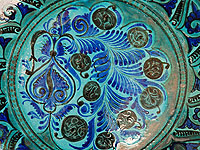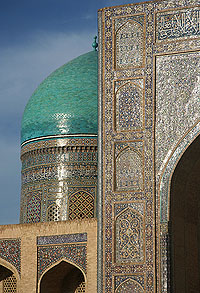 |
|
Uzbekistan - Milestones of History |
|||
|
After Uzbekistan gained its independence, it chose a unique way of development, which is predicated upon building a free civil society based on market relations, and creating higher living standards for its people. The chief essence of the chosen way is a gradual transition to market economy without any pseudo-revolutionary leaps, tragic consequences, and powerful social shake-ups. This method has been worked out given the specific prerequisites of the country's development. Above all, it is based upon the national-historical way of life of local people, way of thinking, as well as national traditions and customs. The assessment of the "Islamic factor" is significant while working out and realizing both domestic and foreign policies. It is reflected in the way of life, people's psychology, spiritual values, and a strive to unite with the people who practice the same religion. The specific demographic situation in the country is a one of the most important features. The given situation is described by annual high rates of population growth and labor resources. Another feature pertaining to Uzbekistan is its unique national structure. The indigenous population dominates the ethnic make-up in the country. At the same time, there are more than one hundred nationalities living in Uzbekistan. The national diversity of the country, alongside the rise of national self-consciousness and spiritual renaissance serve as a powerful impetus for the renewal of society and its transparency. It also sets favorable ground for the integration of Uzbekistan with the world community. The republic takes an advantageous geo-strategic position. Historically, the territory of modern Uzbekistan has been the venue for the ancient trade routes such as the Great Silk Road. Various cultures co-existed, prospered, and established contacts with outside world from here. Climatic conditions also play a significant role in choosing the methods and approaches to carry out reforms in the country. They provide for the growing of not only a strategic product - cotton, but also of fruits and vegetables, cocoons of the silkworm, and other valuable agricultural products. Furthermore, their yield is enough both to meet domestic needs and export to other countries. Uzbekistan has enough potential to uphold its political and economic sovereignty. The area is rich in various mineral resources that allow for structural changes and develop various spheres of economy that shall pave the way to the world market. The individual way of revival and social progress is a complicated process that covers all spheres in the country: economic, political, social, spiritual, and other. At the same time, it defines the common strategy of both domestic and foreign policy, and its target goal is to build a truly independent Uzbekistan. The Uzbek President Islam Karimov worked out the main principles of domestic and foreign policies of the country. The main task is to gradually create a just society based on a hard working, financially independent, morally strong and civilized family. Uzbekistan is a state with a great future. This is a sovereign, democratic, and legal state. This is state, predicated on principles of humanism, maintaining the rights and freedoms of its citizens, regardless of nationality, religion, social status, and political views. A contemporary and effective system of state administration is being formed in the country with a presidential type of government at its core. The local administrative structure was reorganized, which led to the creation of the position of khokim, or mayor in provinces, districts, and towns. Other structures that make up and ensure the state sovereignty of Uzbekistan are now established, such as the defense ministry, agency for foreign economic activity, National Security Service, State Customs Committee, etc. Also, the country's banking system has been reorganized. Many ministries and institutions have been cancelled. Many countries around the world recognized Uzbekistan 's state sovereignty, and established diplomatic relations with it. |

